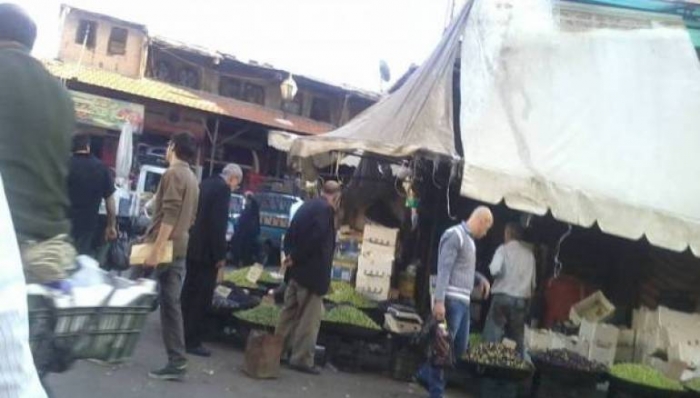Amara Market, a small and popular marketplace near the Old City of Damascus, where almost everything ingredient can be found, differs from most of the capital’s markets in its low prices where working and middle class people can afford to shop.
The market is home to a broad range of produce, from parsley to pickled olives and tomato paste, cured eggplant, dates, tea, and other kinds of food. On the side roads are shops for second-hand clothes, where people can buy clothes for 50 Syrian pounds (20 cents in USD) a piece.
Amara is one of the oldest markets in Damascus, connected to Thawra St, busy with job seekers and beggars displaced from their houses, villages and cities.
Sometimes, stalls will sell only a single product. Farmers from Kafer Soosah come by bicycle to sell their farm produce, offering vegetables at low prices to guarantee a sale.
In Bab Srijah, a bunch of parsley is sold for 25 Syrian pounds in cold weather, and 15 in normal weather, but in Amara market, it’s possible to find two or three bunches for only 25 Syrian pounds.
Regarding preserved food, many stalls sell different types and qualities of pickled olives at prices ranging between 200-350 Syrian pounds.
Market-goers can find women selling homemade products, like tomato paste, cheese, dried figs and apricots, raisins, because men cannot afford to risk arrest by wondering through the market.
The cows and sheep that produce the market’s dairy are known to eat from irrigated fields with access to relatively clean water from natural sources.
Syrians usually prefer raw cheese to processed cheese, adulterated with added starch and other chemicals. The price of a kilogram of original cheese does not exceed 500 Syrian pounds in the Amara and Baramkeh markets, but can reach to 800 Syrian pounds for the processed kind.
Escaping the municipality’s workers is another difficulty facing small traders, as a minor offence could result in their dismissal and the seizure of their stalls, sometimes losing their products in the process.
The city of Damascus is a huge market for different kinds of products to suit different levels of income. Shaalan and Salhiyah markets remain busy with their affluent customers, who come in luxury cars to buy their readymade food, while the Bab Srijah Market offers its goods to middle-class customers. The Thawra St Market and the Thieves Market meanwhile are a refuge for the poor and homeless, where they can find food and other necessities on a tiny budget.
The effects of Damascus’s income gap is worsened by a group of greedy traders, who invest in the tragedy of the country for the benefit of their own wealth, as they remain protected by a regime eager to keep people poor in order to force residents to choose between their security and hunger.
This article was edited by The Syrian Observer. Responsibility for the information and views set out in this article lies entirely with the author.


